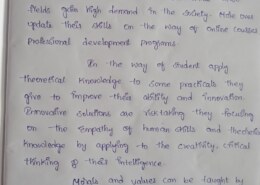What is ‘ emotional intelligence’ and how does it help an individual in making ethical decisions?
The possible effects of mobile phone use on children's general development and health are a common worry among parents. 1. Parents are concerned that their children's excessive screen time may result in physical problems like bad posture, eye strain, and a sedentary lifestyle, all of which may exaceRead more
The possible effects of mobile phone use on children’s general development and health are a common worry among parents.
1. Parents are concerned that their children’s excessive screen time may result in physical problems like bad posture, eye strain, and a sedentary lifestyle, all of which may exacerbate health issues like obesity and vision problems.
2.Concerns have also been raised regarding the impact on mental health, including higher risks of anxiety, depression, and irregular sleep cycles as a result of exposure to blue light.
3.Parental anxiety is also increased by the possibility of cyberbullying, exposure to inappropriate content, and risks related to online safety.
4.Parents are also worried about the distractions that cell phones can provide, which could have an impact on social skill development and academic achievement.
These problems emphasize the necessity of careful and balanced management.
See less


Emotional intelligence (EI) refers to the ability to recognize, understand, and manage one's own emotions and to recognize, understand, and influence the emotions of others. It encompasses skills like emotional awareness, empathy, self-regulation, and social skills. In ethical decision-making, EI plRead more
Emotional intelligence (EI) refers to the ability to recognize, understand, and manage one’s own emotions and to recognize, understand, and influence the emotions of others. It encompasses skills like emotional awareness, empathy, self-regulation, and social skills.
In ethical decision-making, EI plays a critical role. Firstly, self-awareness allows individuals to understand their values and biases, ensuring that decisions align with their core beliefs. Self-regulation helps manage emotions that could cloud judgment, such as anger or fear, promoting rational thinking.
Empathy, a key component of EI, enables individuals to consider the feelings and perspectives of others affected by their decisions. This leads to more compassionate and fair outcomes. For instance, in a workplace scenario, an empathetic leader is more likely to make decisions that consider employee welfare, fostering a positive ethical climate.
Furthermore, strong social skills, another facet of EI, aid in effectively communicating and implementing ethical decisions. These skills help in resolving conflicts, garnering support for ethical initiatives, and fostering a culture of integrity.
Overall, emotional intelligence equips individuals with the tools to navigate complex moral landscapes, balance personal and collective interests, and make decisions that uphold ethical standards and promote the well-being of all stakeholders.
Emotional intelligence (EI) refers to the ability to recognize, understand, and manage one’s own emotions and to recognize, understand, and influence the emotions of others. It encompasses skills like emotional awareness, empathy, self-regulation, and social skills.
In ethical decision-making, EI plays a critical role. Firstly, self-awareness allows individuals to understand their values and biases, ensuring that decisions align with their core beliefs. Self-regulation helps manage emotions that could cloud judgment, such as anger or fear, promoting rational thinking.
Empathy, a key component of EI, enables individuals to consider the feelings and perspectives of others affected by their decisions. This leads to more compassionate and fair outcomes. For instance, in a workplace scenario, an empathetic leader is more likely to make decisions that consider employee welfare, fostering a positive ethical climate.
Furthermore, strong social skills, another facet of EI, aid in effectively communicating and implementing ethical decisions. These skills help in resolving conflicts, garnering support for ethical initiatives, and fostering a culture of integrity.
Overall, emotional intelligence equips individuals with the tools to navigate complex moral landscapes, balance personal and collective interests, and make decisions that uphold ethical standards and promote the well-being of all stakeholders.